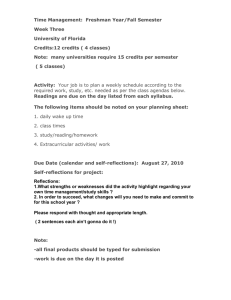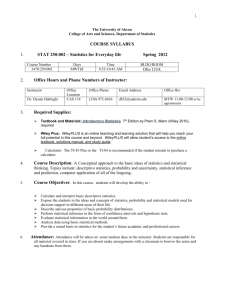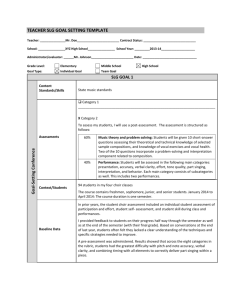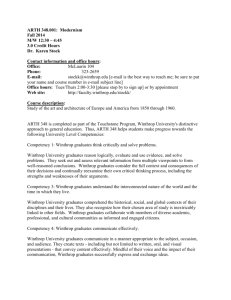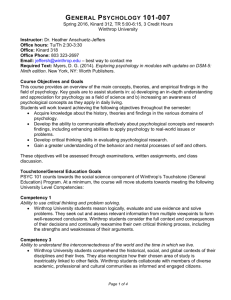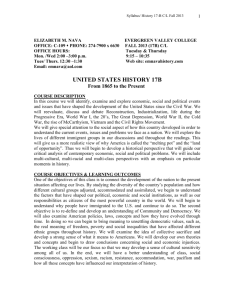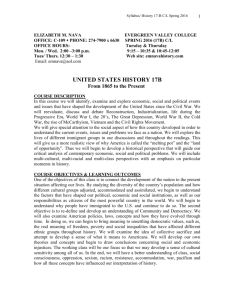Spring 2013 Syllabus - Winthrop University
advertisement
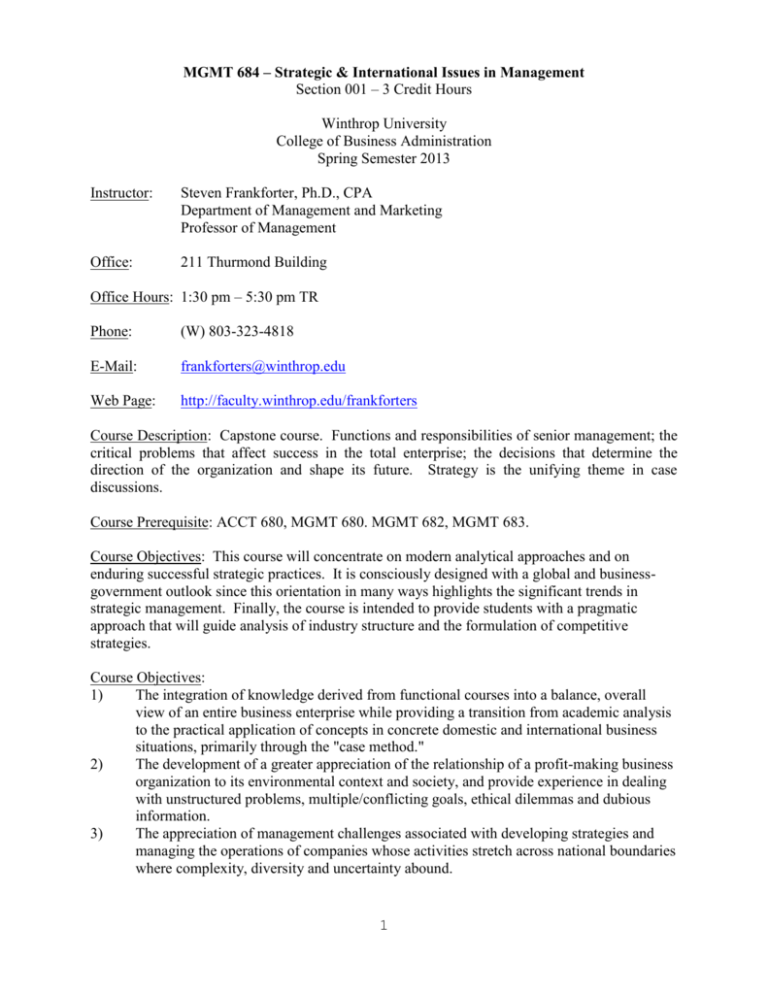
MGMT 684 – Strategic & International Issues in Management Section 001 – 3 Credit Hours Winthrop University College of Business Administration Spring Semester 2013 Instructor: Steven Frankforter, Ph.D., CPA Department of Management and Marketing Professor of Management Office: 211 Thurmond Building Office Hours: 1:30 pm – 5:30 pm TR Phone: (W) 803-323-4818 E-Mail: frankforters@winthrop.edu Web Page: http://faculty.winthrop.edu/frankforters Course Description: Capstone course. Functions and responsibilities of senior management; the critical problems that affect success in the total enterprise; the decisions that determine the direction of the organization and shape its future. Strategy is the unifying theme in case discussions. Course Prerequisite: ACCT 680, MGMT 680. MGMT 682, MGMT 683. Course Objectives: This course will concentrate on modern analytical approaches and on enduring successful strategic practices. It is consciously designed with a global and businessgovernment outlook since this orientation in many ways highlights the significant trends in strategic management. Finally, the course is intended to provide students with a pragmatic approach that will guide analysis of industry structure and the formulation of competitive strategies. Course Objectives: 1) The integration of knowledge derived from functional courses into a balance, overall view of an entire business enterprise while providing a transition from academic analysis to the practical application of concepts in concrete domestic and international business situations, primarily through the "case method." 2) The development of a greater appreciation of the relationship of a profit-making business organization to its environmental context and society, and provide experience in dealing with unstructured problems, multiple/conflicting goals, ethical dilemmas and dubious information. 3) The appreciation of management challenges associated with developing strategies and managing the operations of companies whose activities stretch across national boundaries where complexity, diversity and uncertainty abound. 1 4) The combination of theory and practice, description and prescription of domestic and global strategic management issues so a to assist the student in developing into a strategist who can live with contradictions, learn to appreciate their causes and effects, and reconcile them sufficiently for planning and implementing effective action. Topics Covered/Course Content: 1) Introduction to Strategic Management and Corporate, Business and functional-level strategy. 2) Role of the Board of Directors, Chief Executive Officer and Members of the Top Management Team in Strategic Management. 3) Formation of Strategy, Strategic Analysis and Introduction to Strategic Business Tools, including Porter's Five-Forces Model, Environmental Scanning, Value Chain Analysis, Functional Analysis and Strategic Mapping. 4) Issues of Structure, Systems, Culture. 5) Innovation. 6) Motivations of Cross-Border Operations and Management. 7) Understanding Worldwide Industry Structure and the Role of Coordination and Localization Pressures. 8) Building Strategic Capabilities: The Competitive and Collaborative Challenges. 9) Organizational Capability: Optimizing Global Efficiency, National Responsiveness and Worldwide Learning. Learning Outcomes and Assessment: Students proficiency in the following areas will be assessed this semester: 1) Oral communication 2) Written communication 3) Critical thinking 4) Ethics 5) Applied ethics 6) Leadership 7) Applied leadership 8) Problem-solving 9) Applied problem-solving 10) Strategic thinking 11) MBA assessment test Syllabus Change Policy: Keep in mind that this syllabus is subject to change. Students will be notified if changes are required to any content reflected in this syllabus. Students with Disabilities Winthrop University is dedicated to providing access to education. If you have a disability and require specific accommodations to complete this course, contact the Office of Disability Services (ODS) at 803-323-3290. Once you have your official notice of accommodations from the Office of Disability Services, please inform me as early as possible in the semester. 2 Student Conduct Code: As noted in the Student Conduct Code: “Responsibility for good conduct rests with students as adult individuals.” The policy on student academic misconduct is outlined in the Student Conduct Code Academic misconduct Policy in the Student Handbook online (http://www2.winthrop.edu/studentaffairs/handbook/StudentHandbook.pdf). College of Business Administration Assessment Goals/Requirements for this course: The following assessments will be administered during the semester: 1) Oral communication – evaluated during oral presentations. 2) Written communication – evaluated with the strategic analysis paper. 3) Critical thinking - evaluated with the strategic analysis paper. 4) 9 Question Assessment Test – to evaluate ethics. 5) 2 Question Assessment Test – to evaluate applied ethics. 6) 14 Question Assessment Test – to evaluate leadership. 7) Applied Leadership – evaluated by group members and the end of the term. 8) 20 Question Assessment Test – to evaluate problem-solving. 9) 5 Question Assessment Test – to evaluate applied problem-solving. 10) 6 Question Assessment Test – to evaluate strategic thinking. 11) 85 Question Assessment Test – to evaluate student knowledge of the business core. Drop Policy: Withdrawal from a course must be within the first 60% of the instructional days of the course. An automatic N is issued up to then. After then, students may not withdraw from a class without documented extenuating circumstances. Required Textbooks: 1) Strategic Management: An Integrated Approach, Hill and Jones (2013), 10th edition. Boston: Houghton Mifflin Company. ISBN 978-1-111-82584-3. 2) Global Strategy: Creating and Sustaining Advantage Across Borders, (2006). Oxford University Press. ISBN 978-0-19-516720-7. Grading Components and Associated Weights Exams (2 @ 250 pts) Oral Presentation #1 Oral Presentation #2 Team Leadership Participation Strategic Analysis Paper Total 500 pts 50 100 50 50 250 1000 pts Course Policies: 1) Plagiarism, cheating, or any other form of academic dishonesty will result in a course grade of F regardless of any other performance considerations. 2) Make-up exams will not be given except where the student has secured permission from the instructor in advance or when the student has a written medical excuse from a doctor. In all other instances, a grade of zero will be recorded. 3 3) Final grades will be determined on the following basis, before considering participation: A = over 933 pts A- = 900 – 933 B+ = 867 – 899 B = 834 – 866 B- = 800 – 833 C+ = 767 – 799 C = 734 – 766 C- = 700 – 733 F = 699 and below 4) Expectations of Students: a) You must read assigned course materials before class meets. b) Students are expected to be on-time for class and should turn off laptops and phones before class begins. c) Students are expected to recall concepts from prerequisite courses so that instruction will be conducted at the appropriate level. d) Students are expected to exhibit high levels of responsibility should attend all agree-upon meetings when working on the class project. Explanation of Grading Components: 1) Exams. There will be two exams, which will have essay and multiple-choice questions. 2) Oral Presentations. Two presentations will be given on a team strategic planning project for a company or organization. Each report will be presented in class. The reports will be at least 12 minutes and under no circumstances should they exceed 20 minutes. There are attire requirements for the 2nd presentation - students should dress professionally, as if for a job interview (e.g. wearing a suit and dress shoes, etc.). If a student fails to attend class (without advance permission) when his/her group is assigned to present, he/she will receive a grade of 0 for the presentation. Content: a) The content of the 1st oral presentation should cover the group’s preliminary information and findings. b) The content of the 2nd oral presentation should cover the group’s final analysis and recommendations. 3) Team Leadership. Each member of every group will be evaluated for the leadership they exhibit in helping to complete the following tasks during the semester: a) Preparing and delivering the 1st oral presentation. b) Preparing and delivering the 2nd oral presentation. c) Completing the strategic analysis paper. The evaluation of a group member’s leadership contributions to the delivery of one of the above-named tasks will be performed by his/her group’s peers at the end of the semester. 4 4) Participation. Verbal participation is encouraged in order to encourage you to share your knowledge with the class, to facilitate your own involvement in the education process, to stimulate the interest of yourself as well as others in the class, and to allow me an opportunity to assess your understanding of course materials. Participation will be of maximal importance when we discuss chapter materials in class. Not only must you have read the assigned chapters from the books in preparation for class, but you are also charged with the responsibility of formulating and communicating your own opinions regarding those readings. This is to ensure that you will have something meaningful to contribute to the class discussion. Keep in mind that students who are not in attendance are not considered to have participated at that class session. As a part of class participation, each group will lead a discussion about a case from the book “Global Strategy: Creating and Sustaining Advantage Across Borders.” 5) Assessment Test. The College of Business Administration conducts an assessment test to evaluate overall student performance in the semester they are scheduled to graduate. Students are not expected to prepare for this test. 6) Strategic Analysis Paper. Each group will prepare and submit a comprehensive strategic analysis report. This paper should be an expansion of the material covered during the oral presentations. The paper is due at the beginning of the final exam session. TENTATIVE COURSE SCHEDULE DATE TOPICS M 1/7 Class Introduction & Orientation Presentations by clients for group projects Hill & Jones (H&J) Chapter 1 Assign Students to Groups and Discussion of the Group Term Project Assignment of Projects to Groups M 1/14 H&J Chapter 2 & 3 Inkpen & Ramaswamy (I&R) Chapter 1 M 1/21 Holiday – No Class M 1/28 H&J Chapter 4 I&R Chapter 2 Barney Reading M 2/4 H &J Chapters 5 & 6 I&R Chapter 4 Uzzi Reading 5 M 2/11 H&J Chapter 7 I&R Chapter 5 Review for Exam 1 M 2/18 Exam 1 (H&J Chapters 1-7, I&R Chapters 1, 2, 4, & 5) M 2/25 H&J Chapter 8 & 9 I&R Chapter 6 M 3/4 Oral Presentation #1 M 3/11 Spring Break – No Class M 3/18 Oral Presentation #1 I&R Chapter 7 M 3/25 H&J Chapters 10 & 11 I&R Chapter 8 M 4/1 H&J Chapter 12 I&R Chapter 9 Greiner Reading M 4/8 H&J Chapter 13 I&R Chapter 3 Review for Exam 2 M 4/15 Exam 2 (H&J Chapters 8-13, I&R Chapters 3, 6-9) M 4/22 Oral Presentation #2 Assessment Test Final Exam Session: Monday 4/29 at 6:30 pm Oral Presentation #2, Assessment Test Attending the final exam session is MANDATORY 6



